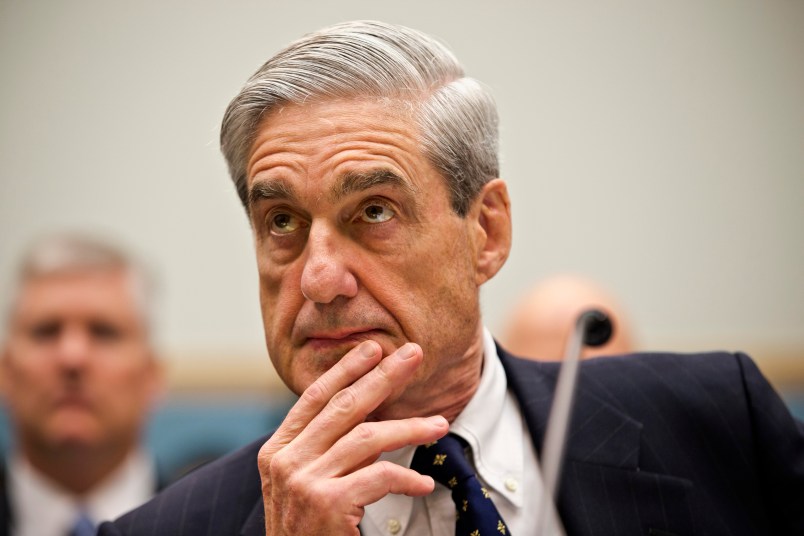A federal judge in Washington expressed concern Friday morning about giving a Russian company charged with conspiring to influence the 2016 presidential election via a social media troll campaign access to sensitive information about American citizens.
U.S. District Court Judge Dabney Friedrich ordered the company’s attorney and special counsel Robert Mueller’s team to craft an agreement within 10 days that will govern what data the defendants can see and what should be withheld out of fear it could be passed into the hands of hostile foreign agents, namely Russia intelligence.
“The government has presented good evidence for protecting some information from discovery, including sensitive but not classified information related to ongoing investigations and personal identifying information about victims of identity theft,” Friedrich said.
Mueller unveiled an indictment in February charging Concord Management and Consulting LLC with conspiring to defraud the United States. The corporation pleaded not guilty in early May. Since then, the two sides have been fighting over Concord’s ability to see the mountains of data the special counsel’s office has collected in the case, including information about the American citizens the Russian trolls are charged with impersonating, and targets of Mueller’s investigation who have not yet been charged. Concord Management is owned in part by Yevgeniy Prigozhin, a restaurant mogul with close ties to Vladimir Putin.
Mueller’s team has previously warned the court that Concord is attempting to use the case to gain access to sensitive information that could assist current and future Russian efforts to meddle in the U.S. democratic process.
“Public or unauthorized disclosure of this case’s discovery would result in the release of information that would assist foreign intelligence services, particularly those of the Russian Federation, and other foreign actors in future operations against the United States,” Mueller said, noting in particular the threat of exposing “uncharged individuals and entities that the government believes are continuing to engage in interference operations like those charged in the present indictment.”
Judge Friedrich lamented at the start of Friday’s hearing that “it’s unfortunate” the fight over discovery has dragged on so long, saying that she’s “disappointed” more progress has not yet been made and asking for a preliminary agreement by the end of the day.
“It’s a tough balance to strike here,” she added. “I would much rather you work out an agreement than I write one for you.”
As part of that agreement, Friedrich agreed with the prosecutor’s suggestion that a Justice Department attorney not affiliated with Mueller’s team be appointed as a “firewall counsel.” The firewall counsel would raise any objections the government might have to the company’s lawyers sharing the discovery with third parties as they prepare their case, without Mueller’s team being privy to the details. The judge also said the indicted company’s attorney must ask the court’s permission going forward to share the documents it does gain access to with any foreign national.
Concord’s lead attorney Eric Dubelier objected, saying, “If I can’t see the evidence, I don’t know who I need to share it with.”
Friedrich responded: “Once you see the evidence, you can come to the court and say, ‘I need to share it with this or that individual.'”
Dubelier conceded that a “firewall counsel” is appropriate, but suggested the process will quickly become untenable. “Do you want me coming in every day saying, ‘Can I show this? Can I show that?” Friedrich acknowledged that the court may need to hire a special master to handle that aspect of the case so it does not become a “full-time job” for her.
Though most of Friday centered on technical procedural questions, tensions between the two sides intermittently flared up.
“Clearly this is an unprecedented case, Your Honor, because the deputy solicitor general of the United States is down here at the courthouse with us common folk,” Dubelier sneered at one point, pointing to senior prosecutor Michael Dreeben.







From the reporting, the judge seems to be handling the issue appropriately. She basically told the defendant, you better agree on something reasonable with the prosecution, because you aren’t going to get a better deal out of me.
Sorry, Russians, even federal discovery has some limits and is subject to reasonable restrictions and protections.
On a more serious note…
Will take feckless shit Nunes try to subpoena his way into this?
PS Took me 7 tries to subpoena to pass the spell check… I bet the Bar exam has this as a spelling bee component…
Just a hint, genius. That’s how high the stakes are.
I’m betting the information somehow makes its way to the wrong hands by accident. These lawyers are too arrogant.
"personal identifying information about victims of identity theft,”
Huh. What is that all about I wonder?
I can’t help imagining how fucking hilarious it would be if it all turns out that Strzok’s and Page’s phones were hacked to send those idiotic texts…but that’s probably too much comedy to hope for.